 Petzlover
Petzlover Cabecudo Boiadeiro is originated from Brazil but Newfoundland Dog is originated from Canada. Both Cabecudo Boiadeiro and Newfoundland Dog are having almost same height. Both Cabecudo Boiadeiro and Newfoundland Dog are having almost same weight. Both Cabecudo Boiadeiro and Newfoundland Dog has almost same life span. Both Cabecudo Boiadeiro and Newfoundland Dog has almost same litter size. Cabecudo Boiadeiro requires Low Maintenance. But Newfoundland Dog requires Moderate Maintenance
Cabecudo Boiadeiro is originated from Brazil but Newfoundland Dog is originated from Canada. Both Cabecudo Boiadeiro and Newfoundland Dog are having almost same height. Both Cabecudo Boiadeiro and Newfoundland Dog are having almost same weight. Both Cabecudo Boiadeiro and Newfoundland Dog has almost same life span. Both Cabecudo Boiadeiro and Newfoundland Dog has almost same litter size. Cabecudo Boiadeiro requires Low Maintenance. But Newfoundland Dog requires Moderate Maintenance
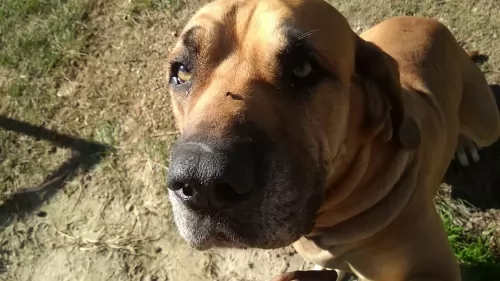 The Cabecudo Boiadeiro has always played an important role in the management of livestock. Stockdogs like this were known in parts of Minas Gerais as early as the 18th century. In fact reports tell us that the Cabecudo has existed since the 16th century as a working dog in the rural parts of Brazil.
The Cabecudo Boiadeiro has always played an important role in the management of livestock. Stockdogs like this were known in parts of Minas Gerais as early as the 18th century. In fact reports tell us that the Cabecudo has existed since the 16th century as a working dog in the rural parts of Brazil.
The Capecudo has remained much the same over the centuries – a dog created as a guardian for large properties, as a game hunter and livestock herder and protector. Today this Molosser dog still drives cattle in Brazil.
 The Newfoundland dog is a large working dog. They were bred and used as a working dog for fishermen in the Dominion of Newfoundland, an eastern province of Canada. With their web feet they were also used for water rescue.
The Newfoundland dog is a large working dog. They were bred and used as a working dog for fishermen in the Dominion of Newfoundland, an eastern province of Canada. With their web feet they were also used for water rescue.
The history of the Newfoundland Dog is unsure, but the breed as we know it today originated from dogs which were brought from Newfoundland to England in the early 1800's.
The Newfoundland Club was founded in 1886 so as to promote the breed.
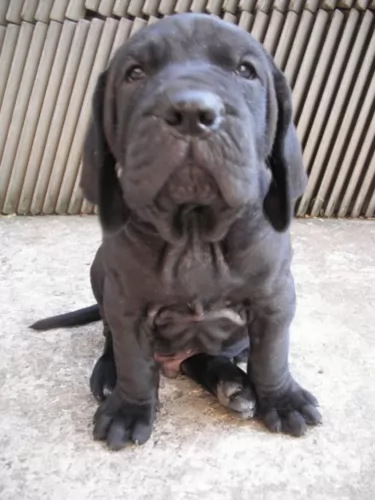 The Brazilian Cabedudo is a strong boned, large dog with a large head and a deep chest. The coat of the dog is short and dense and in wheat-colored shades or fawn shades, while brindle is also in existence. The Cabeçudo Boiadeiro is also known as the Brazilian Mastiff and is a large, imposing dog.
The Brazilian Cabedudo is a strong boned, large dog with a large head and a deep chest. The coat of the dog is short and dense and in wheat-colored shades or fawn shades, while brindle is also in existence. The Cabeçudo Boiadeiro is also known as the Brazilian Mastiff and is a large, imposing dog.
Because the breed was created from a blend of the English Mastiff, the Bulldog and the Bloodhound, not only is this a large dog in height, but a big boned dog as well. He has short to medium length floppy ears and a long tail.
The Brazilian Cabedudo is a courageous dog. When he has been properly trained and socialized, this large dog is capable of becoming an obedient, loving and devoted family pet who is able to get along with children and other pets too. He reserves this gentler side of him for his human family and won’t easily tolerate strangers.
 The Newfoundland is a large dog standing at between 63cm to 74cm, both male and female. Weight can vary from 45kg to 80kg.
The Newfoundland is a large dog standing at between 63cm to 74cm, both male and female. Weight can vary from 45kg to 80kg.
He has a double coat of medium-length straight hair and the hair can be black, brown or gray. Although it is common for the Newfoundland to have a solid-colored coats, you will sometimes find small patches of white on their chest, toes, or at the tip of the tail. Then again you get the less common Newfoundlands where the coat is white with some black markings and these are known as Landseers.
The outer coat is coarse, oily and water-resistant quality, suited to a dog that loves to spend time in the water. The head is broad and large with small ears that he keeps lying close to his head. The tail is long and plumed and the feet are wide with webbing between the toes which aids him with swimming.
As with many large dogs, the Newfoundland is docile and his sheer size makes it that he is best suited to life in the countryside as opposed to living in the city. This is also because this particular dog wants to be close to water where he can swim.
He is a trustworthy, loyal dog and will get on well with children and pets in the home. Training and socialization is always recommended for any dog, but a big dog can often ‘get in the way’ indoors and you want him to lie down or sit when you tell him to. He is an intelligent dog so will respond well to training.
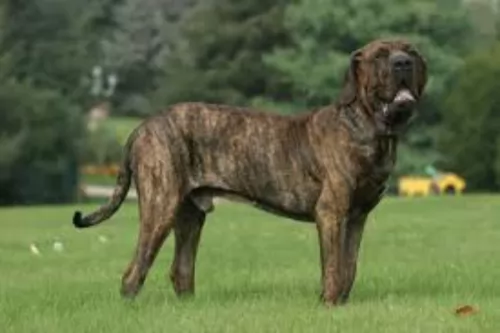 Deciding to become an owner of a dog is a big responsibility, as you are going to have your pet with you for 10 – 15 years at least. There are so many essentials to remember with owning a dog and most dogs are far happier and healthier when allowed to live part of the time indoors with their human family.
Deciding to become an owner of a dog is a big responsibility, as you are going to have your pet with you for 10 – 15 years at least. There are so many essentials to remember with owning a dog and most dogs are far happier and healthier when allowed to live part of the time indoors with their human family.
It's not always easy being a large dog such as the Cabecudo Boiadeiro, as people often assume these mastiff-type dogs are unfriendly and aggressive.
Every dog breed however, is essentially the product of his owners lifestyle and his unique upbringing with them. When this large pet is properly trained and socialized and he is loved and well cared for, he promises to be faithful, devoted, playful and loving – a real friend and protector.
 Your beautiful, cuddly puppy will soon become a giant dog with a big appetite. Don’t just buy a cute puppy if you can’t afford to feed him properly and you can’t give him lots of attention.
Your beautiful, cuddly puppy will soon become a giant dog with a big appetite. Don’t just buy a cute puppy if you can’t afford to feed him properly and you can’t give him lots of attention.
Your dog will also be shedding, so be aware of these aspects before you bring a large Newfoundland into your home. He is a gentle dog, but his size could be worrisome if he isn’t trained, socialized and supervised.
Newfoundlands are amicable dogs, and while he may like to spend times indoors with you relaxing, he is a working dog and will require exercise and activities for mind and body.
Give this giant of a dog a loving home, and you will have a special, devoted friend like no other.
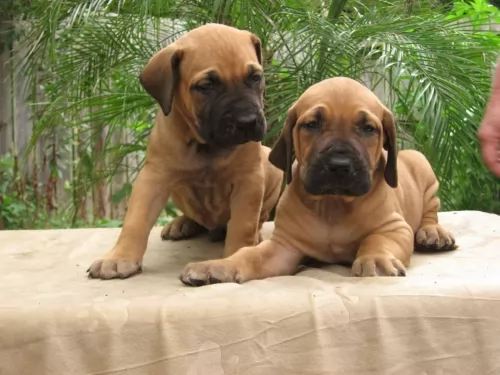 The Cabecudo Boiadeiro is considered a robust breed, used to lots of exercise while herding livestock. With good care and plenty of exercise he can live to 10, 11 or 12 years of age. He is a large breed and this fact alone will ensure that you be aware of some dog illnesses prone to larger breeds.
The Cabecudo Boiadeiro is considered a robust breed, used to lots of exercise while herding livestock. With good care and plenty of exercise he can live to 10, 11 or 12 years of age. He is a large breed and this fact alone will ensure that you be aware of some dog illnesses prone to larger breeds.
This is an orthopedic condition where the hip joints don’t fit properly into the hip joint. Larger breeds such as the Cabecudo Boiadeiro are at a higher risk of getting this orthopaedic disorder.
You’ll see your dog battling to move around and he may not even be able to get up again after lying down. Sometimes a dog might even require surgery. Thankfully, there is testing for hip dysplasia in dogs, and you can ask to see a clearance certificate if you buy your puppy from a so-called reputable breeder.
Progressive retinal atrophy (PRA) is a degenerative eye disorder that can actually lead to blindness in your pet. Night blindness sets in and your dog becomes unsure how to walk in unfamiliar areas, You'll notice that his eyes become gray or cloudy-looking as though there is a film over the eyes. Parent dogs with this eye disease should be spayed or neutered.
 The Newfoundland can be prone to serious health conditions such as hip dysplasia and gastric torsion. Deep chested dog breeds like the New Foundland are susceptible to bloat, a life threatening condition where the stomach swells, it can twist and the dog can die if help isn’t available. He will be salivating, restless and whining while also trying to vomit.
The Newfoundland can be prone to serious health conditions such as hip dysplasia and gastric torsion. Deep chested dog breeds like the New Foundland are susceptible to bloat, a life threatening condition where the stomach swells, it can twist and the dog can die if help isn’t available. He will be salivating, restless and whining while also trying to vomit.
Giant breeds are also prone to elbow and hip dysplasia, a genetic problem which can ultimately affect your dog’s mobility.
When in any doubt about your pet’s health, get him to the vet.
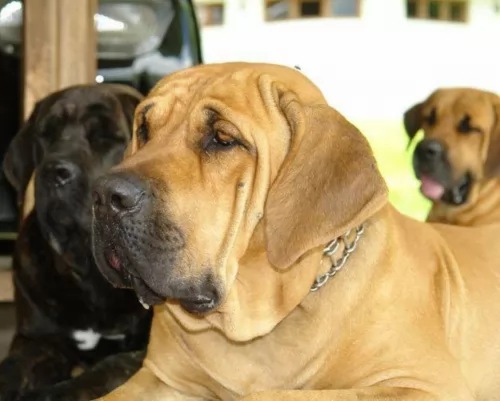 The Cabecudo Boiadeiro is a large breed dog. In spite of his size though, he is surprisingly an active dog. He will need regular exercise such as a brisk walk very day. You can also put aside time to give him some exciting ball games. He is a breed used to working so he will be most unhappy lying around doing nothing.
The Cabecudo Boiadeiro is a large breed dog. In spite of his size though, he is surprisingly an active dog. He will need regular exercise such as a brisk walk very day. You can also put aside time to give him some exciting ball games. He is a breed used to working so he will be most unhappy lying around doing nothing.
If you are going to be feeding your Cabecudo Boiadeiro commercially manufactured good, make sure it is the best quality food. Always go for dog foods which have all the nutrients your large dog requires.
You get wet, dry and raw complete foods and you can give your pet a mix of these. Always make sure that your pet gets some raw meat in from time to time too, otherwise he could battle with skin diseases.
If you aren’t sure how to feed such a large dog, your veterinarian will help you decide which category of food would suit your pet. Clean, cool water is to be provided constantly.
 Your dog’s coat will need to be brushed at least twice a week as he is a heavy shedder.
Your dog’s coat will need to be brushed at least twice a week as he is a heavy shedder.
Do the nails of your dog as soon as they start getting long. Long nails can hook on things and cause injury to the dog’s paw area.
This is a dog with floppy ears so check inside the ears to prevent ear infections, more so because this is a water-loving dog. The dampness inside the ears can cause bacteria.
This is a giant breed and sadly, they have the shortest lifespans. You want to make sure that you keep your giant breed as healthy as possible to ensure he reaches the 10 or so years allotted to him and to also prevent health problems.
Make sure your giant breed puppy and adult has the very highest quality commercially manufactured food to ensure he gets the right balance of nutrients in. This food also makes sure that your puppy rather grows at a slower rate and stronger as opposed to growing too quickly. Rapid growth comes with joint problems.
All dogs, large and small, don’t want exotic, strange food that upsets their stomachs. They want consistency and simplicity and they want tasty food. Give him some homemade food such as cooked chicken, brown rice or pasta and some vegetables such as sweet potato, carrots and spinach. You can add this occasionally to his dry kibble.
Add in some raw meat from time to time too. Your pet will be strong, healthy, happy and content.